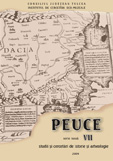Consideraţii asupra implicării Dobrogei şi Ţării Româneşti în relaţiile internaţionale din spaţiul mediteraneano-pontic din deceniul opt al secolului
Appreciations Regarding the Implication of Dabroudja and Wallachia in the Diplomatic Relations in the Mediterranean-Pontic Region of the Eighth Decenn
Author(s): Vasile MărculeţSubject(s): Archaeology
Published by: Institutul de Cercetari Eco-Muzeale Tulcea - Institutul de Istorie si Arheologie
Keywords: Dunărea de Jos; Ţara Românească; Despotatul Dobrogean; Despotatul Dristrei; Dobrogea; Veneţia; Genova; Imperiul Bizantin; Bizanţ; Constantinopol; Trapezunt; Dristra; The Lower Danube; Wallachia; The Despotate of Dobrudja; The Despotate of Drstra; Dobrudja
Summary/Abstract: In the 14th century, international relations in the Mediterranean-Pontic region were dominated by the two rival Italian sea powers, Venice and Genoa. Due to its complex ramifications, the tensed development of the Genoese-Venetian relations in the 8th decade of the 14th century played a crucial part in the progress of international relations in the entire region. Since the beginning of the 8th decade of the 14th century, the tensions between the two rival republics broke out violently. Consequently, pursuing their own interests, other powers in the Mediterranean-Pontic area joined them. Amongst them there were Walachia and the Despotate of Dobrudja. How Genoa’s and Venice’s Pontic policy determined the foreign policy Dobruja’s and Walachia’s foreign policy, what was the involvement of the two Romanian Principalities in the disputes between Genoa, Venice and their allies, which side they supported, what were the consequences and the results, are only few of the aspects that we are trying to elucidate in the present study.
Journal: Peuce (Serie Nouă) - Studii şi cercetari de istorie şi arheologie
- Issue Year: VII/2009
- Issue No: 7
- Page Range: 393-410
- Page Count: 18
- Language: Romanian

